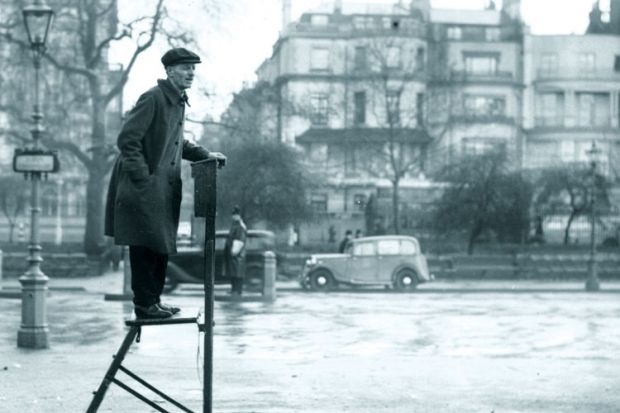Source: Getty
‘I’ll have a glass of wine,’ I replied, only to see him turn wide-eyed to his wife, and mouth the words, disapprovingly: ‘He’s drinking wine!’
“I were tret badly” is a phrase familiar to those born and bred in Sheffield, Yorkshire, where I have worked for the past 30 years. Although it is not an expression that I would necessarily use, that wonderful phrase sometimes pops into my head after I have been somewhere to give a seminar.
It is surprising how often we academics (and other speakers, no doubt) are poorly treated when we go to give a talk. Some organisations seem to take visiting speakers for granted and as a result fail to provide even a minimum standard of courtesy and hospitality. And I am not alone. Many of my colleagues return from speaking engagements with horror stories of their experiences.
One might imagine that part of the problem is that academics are spoiled – that universities are organisations used to hosting speakers and in general know how to treat them. Perhaps it is only when we venture outside academia into the real world – to do outreach – that we encounter different, and sometimes less pleasing, styles of hosting. Not so.
Here’s how not to treat a speaker – and the advice applies equally to all organisations, including universities.
1. On their arrival, fail to greet the speaker or to make them feel welcome.
2. On departure, or after they have returned home, fail to thank them. Giving a talk is a big time investment and a lot of effort, so being thanked makes a difference.
3. Do not feed your speaker, even after he or she has made a long journey. It is remarkable how often host organisations assume that speakers can survive without sustenance.
Once when no food was on offer I bought fish and chips to eat in the car prior to giving my talk. When I added this to my expenses my hosts told me in no uncertain terms that they did not cover food.
On another occasion, food was on offer, but I was asked to bring some cash with me because, I was told, the society would not be paying for dinner and where we were going did not accept credit cards. This was after I had accepted the invitation.
After years of suffering this, I decided recently to make a stand. I shouldn’t have bothered. I arrived at the Italian restaurant to find “Victor Meldrew and his wife” (as I called them) hovering anxiously on the threshold. Would I like a drink? “I’ll have a glass of wine,” I replied, only to see “Victor” turn wide-eyed to his wife, and mouth the words, disapprovingly: “He’s drinking wine!” Conversation over dinner was painful. It all appeared to be an elaborate punishment for having asked to be fed.
4. Fail to introduce your speaker properly. This can be downright insulting. Recently, the chairman of a group of retired people asked me as I was stepping on to the stage if I could tell him what I did.
5. Ask your speaker to produce a manuscript for a paper based on their talk – after they have accepted your invitation. The need for a manuscript should be made clear when the invitation is made.
6. After your speaker has accepted your invitation, ask them to make sure their talk covers X or Y.

If X or Y is part of what one usually talks about there’s no problem, but if it isn’t, it can potentially lead to a lot of extra work. Those tasked with the job of finding and inviting speakers often have no idea of how long it takes to prepare an effective talk.
7. Send information on the venue, timing, directions, visual aids, expenses, etc, in multiple emails and from several different email addresses.
For the speaker, a single point of contact and a single email containing all the relevant information is most efficient.
8. Fail to reimburse travel and subsistence expenses in a timely fashion or, indeed, at all.
9. Fail to tell the speaker about the nature of the venue, the audience or how long the talk should last.
10. Fail to ensure that the audio-visual system works or that session chairs know how it works.
On one occasion, minutes before I was about to give a lecture (and had already checked that the AV and my PowerPoint were fine), the chair of the session blustered in, took the PowerPoint control out of my hand and jabbed the on-off button several times. I watched as the projector went into meltdown. In the 25 minutes it took to find a replacement projector I spoke with no visual aids other than a blackboard.
But this list is partial: hosts can abuse their speakers in numerous other ways.
I once gave a talk to a birdwatching club on the sensitive subject of magpies. Magpies have increased in number during the past 40 years while songbirds have declined. Magpies sometimes eat songbird eggs and chicks and are generally reviled by birders. However, the results of our four-year study revealed absolutely no cause and effect relationship between magpie and songbird numbers (other factors were at work). After I gave my talk, the chairman stood up and thanked me and then, addressing the audience, added: “But we don’t believe you.” The entire audience nodded in agreement.
The trick, I later realised, is to try to turn a bad experience into something valuable. More by luck than judgement, this happened with two of my most challenging talk experiences.
When I was starting a study on the cultural significance of bird-keeping, I thought it would be a good idea to do some “fieldwork” so I agreed to talk to a group of bird-keepers. Most meetings of this sort take place in the upstairs rooms of public houses. This particular pub was in an extremely rough area of an industrial town. I arrived at the allotted time, but no one else turned up for an hour. When they eventually appeared, no one spoke to me. I tried introducing myself.
“Are you here for the bird meeting?” I asked. “Who wants to know?” was the reply. Eventually my host appeared, but he, too, seemed to be trying to avoid me. Eventually, pints in hand, we all trooped upstairs where I stood by my projector waiting to be introduced. I waited. Suddenly from the back of the room an impatient voice boomed: “Well, go on then!”

I got into the skimpy sleeping bag with all my clothes on, curled up into the fetal position and prayed for either sleep or a coma
I did, but not well. The audience, all men, leaned as far back in their chairs as possible: the body language screamed negativity. After 30 minutes there was a break for more beer and I decided to change tack. When we reconvened, I abandoned my original talk and concentrated on how bird-keepers could maximise the fertility of their birds’ eggs – a subject I had been studying. Slowly both the atmosphere and the body language changed and by the end they were asking questions more enthusiastically than any undergraduate group I have ever taught.
I later realised that my title of professor had probably intimidated them. Most bird-keepers are working men: miners, steelworkers, bricklayers and decorators, with little experience of the academy. Once they knew I had kept birds myself and cared about the same things that they cared about, there was no problem. Their close contact with birds gave them extraordinary insight and several of them went on to help me with my research on this topic.
On another occasion I was invited to speak at a (kind of) festival on creativity. The honey-voiced woman I spoke to on the phone told me that the overnight accommodation would be in tents. When I told her I had done more than my fair share of tents, she assured me that these were luxury tents and I’d be very comfortable. I acquiesced.
When I arrived at the venue I was ungreeted and ignored. I went to check out the tent and was dismayed to find that ideas of luxury are not universal. There was a one-season sleeping bag (even though night-time temperatures were around 0 degrees Celsius), no groundsheet and I could see that I would be sharing with 14 others. I returned to the venue for dinner but whoever was hosting the event continued to ignore me. At 11pm, because I was the first speaker the next day, I walked up to the field in the dark and into the tent. I was alone. I got into the skimpy sleeping bag with all my clothes on, curled up into the fetal position and prayed for either sleep or a coma. Neither came and I was still wide awake (and shivering) at 1am when my 14 tent mates arrived, all extremely inebriated. After a sustained chorus of belching and farting they got into their sleeping bags, fell asleep and snored like chainsaws. At 4am I got up and sat in my car with the heater on full blast, and remained like that until first light.
Just before 9am I went to the venue (in another tent) where the honey-voiced woman appeared and asked if everything was all right. As I started to tell her that it wasn’t, she simply turned on her heel and disappeared – I never saw her again.
On stage, I introduced myself. To my surprise, despite the trauma of no sleep, mild hypothermia and excessive flatulence (them, not me), I managed to give a competent performance. I was glad, however, to get home. Later, I discovered they had videoed the talk even though I had asked them not to, and even though I later refused to sign the release forms. The video ended up as a well-received TED talk, so perhaps there was a silver lining.
In the past few years I have given a fairly even spread of talks at conferences, schools, literary festivals and Café Scientifique, as well as to the local council, birdwatching clubs, retired academic groups and retired businessmen. The majority went relatively smoothly, many were enjoyable and just 10 per cent fell into my “poor” category – but of course it is that 10 per cent that stands out. Far from being confined to outreach events, three were academic meetings, three were “creative” events, two were academic seminars, two were at a bird club and one was to a retired group. Without doubt, the best hosts have been literary festivals and Café Scientifique.
So the “take-home message”? If you are hosting a speaker, please do try to avoid all the mistakes listed above. But many of the organisations most in need of some hosting guidance will never read this article. As a result, the onus is on us. If you are a speaker and you want to avoid being “tret badly”, insist on the necessity of being fed and ask hosts to relay all information through a single contact. If you don’t want to produce a paper based on your talk, or spend the night in a tent, say so. Stand up for your speaker’s rights!
Register to continue
Why register?
- Registration is free and only takes a moment
- Once registered, you can read 3 articles a month
- Sign up for our newsletter
Subscribe
Or subscribe for unlimited access to:
- Unlimited access to news, views, insights & reviews
- Digital editions
- Digital access to THE’s university and college rankings analysis
Already registered or a current subscriber? Login





